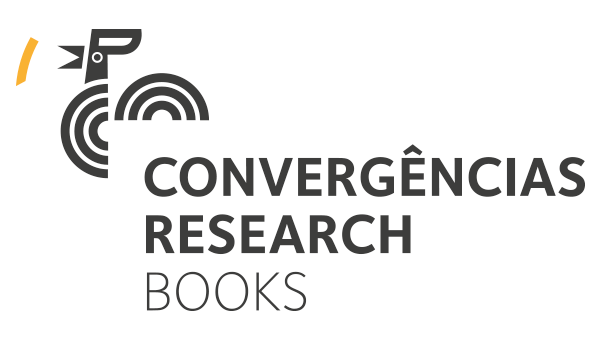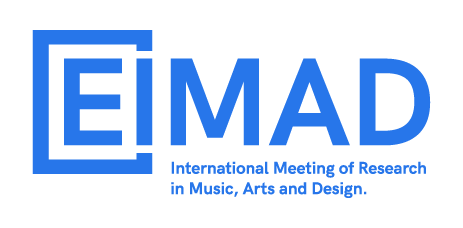IMPORTANT DATES
2nd CALL FOR PAPERS
From February 5 to April 7, 2024
NOTIFICATION
May 12, 2024
PAPER FINAL VERSION
Up to May 26, 2024
IMPORTANT DATES
1st CALL FOR PAPERS
From August 22 to November 26, 2023
NOTIFICATION
February 5, 2024
PAPER FINAL VERSION
Up to February 19, 2024
EIMAD
June 27, 28 and 29 2024
The Polytechnic Institute of Castelo Branco, through the School of Applied Arts, promotes the 9th EIMAD – International Research Meeting on Music, Art and Design, on June 27, 28 and 29, 2024. The congress is a space for sharing and disseminating research results in the areas of design, music and arts.
EIMAD assumes its contribution to the Sustainable Development Goals, defined by the United Nations General Assembly in Agenda 2030. In addition, EIMAD establishes a correlation between the objectives of the UN 2030 Agenda with the principles of the European Commission’s New European Bauhaus initiative, namely in the relationship between the European Green Deal and the improvement of the quality of life, places and living.
Thus, the articles submitted to EIMAD must demonstrate their scope and framework regarding the intersection of the specialty areas of design, music or arts, with one or more of the Sustainable Development Goals of the UN Agenda 2030 and / or NEB principles: Beauty, Sustainability and Inclusion, in the following areas: 1. reconnecting with nature; 2. rediscovering a sense of belonging; 3. prioritising the places and people that need it most; 4. fostering long-term sustainable development, circularity and integrated thinking in the industrial ecosystem.

AREAS FOR SUBMISSION
Submissions can be made of complete long or short articles in one of the following areas:
Communication Design
– Example of Keywords in this area (to be related to the UN 2030 Agenda and NEB)
Editorial Design
Graphic Design History
Interaction Design / Multimedia Design
Motion Graphics
Packaging and labels
Exhibition design
Character Design
Design Systems
Typography
Visual Identity and Branding
UX Design / Digital Design
Wayfinding and wayshowing
– Others
Interior and Furniture Design
– Example of Keywords in this area (to be related to the UN 2030 Agenda and NEB)
Commercial Interiors
Domestic Interiors
Ephemeral spaces
Furniture
Industrial / Product
Interior Design Visualization
Interior Design History
Public Interiors
– Others
Fashion and Textile Design
– Example of Keywords in this area (to be related to the UN 2030 Agenda and NEB)
Textiles, smart materials, and interactivity
Technical clothing
Fashion Design History
Sportswear
Apparel and Garment
Fashion Trends
Patternmaking and Stamping
Luxury
Jewelery
Shoes, bags and accessories
Fashion Design Production
Editorial styling
– Others
Digital Media
– Example of Keywords in this area (to be related to the UN 2030 Agenda and NEB)
Data Sonification
Data Visualization
Digital Media
Digital storytelling
Games / Gamification
Interactive Music
Sound and Music Computing
Sound Art
Sound Branding
Sound Design
Sound Installation
Music for Media
New Interfaces for Musical Expression
Transmedia
Video Mapping
– Others
Design Education
– Example of Keywords in this area (to be related to the UN 2030 Agenda and NEB)
CoDesign
Design & Innovation
Design Thinking
Educational Technologies
Design curriculum and educational policies
Design Didactics
Design pedagogy
Participative Design
– Others
Music and Musicology
– Example of Keywords in this area (to be related to the UN 2030 Agenda and NEB)
Composition
Electronic Music
Ethnomusicology
Music Analysis
Music Didactics
Music History
Music Iconography
Music Information Retrieval
Music Technology
Music Theory
Musical Production
– Others
Music Education
– Example of Keywords in this area (to be related to the UN 2030 Agenda and NEB)
Educational Technologies
Music curriculum and educational policies
Music Didactics
Music pedagogy
Psychology of Music and of Music Education
Recording Technics and Technologies
Sociology of Music and of Music Education
– Others
Arts
– Example of Keywords in this area (to be related to the above areas and UN 2030 agenda and NEB)
Art education
Art history
Art empowerment
Art Infusion
Public Art
Semiotics and Aesthetics
Visual Arts
– Others
ARTICLE EVALUATION SYSTEM
Evaluation Process
Papers (submissions) will be appreciated by the Scientific Committee, in Double-blind peer review system.
The Double-blind peer review system is a process whereby two or more members of the EIMAD Scientific Committee anonymously evaluate the paper, ie without knowing the author’s identity. The Commission makes a qualitative assessment, which may include recommendations for improvement, subsequently sent to the author and which should be considered. Accepted papers will be included in the EIMAD programme for public presentation and publication in the book of abstracts, in addition to publication in the Springer or IPCB book, provided the author is registered for the event.
Submissions may be approved without improvement, approved conditional upon the introduction of improvements, or rejected.
TYPOLOGIES OF PAPERS
The organising committee of the 9th EIMAD, 2024, invites the submission of original long/short papers in one of the following categories:
1. Fundamental Research Papers: A paper that provides new information based on original research, namely from MPhil or PhD research. It is usually forward-looking and based on active research in a real-life context, through a qualitative process or in-depth statistical analysis. The conclusions of the paper should be supported by the data provided in the results.
2. Case Reports: This Type of paper is a description of a single project or a group of cases with unique or related characteristics. Case Reports are usually short and focused on a process of solving a problem and can be:
– Explanatory (The author has no control over the experience, as this method is to explain similar events or methods from objects made by third parties);
– Descriptive (The author has no control over the experience, as this method is to describe events sequentially or methods that occurred and were made by third parties);
– Exploratory (The author is the one who develops the research process and can be a study variable, especially in terms of design solutions. Practical and applied projects developed in research, academic or commercial context).
3. Review Papers: This is a detailed analysis of developments on a specific topic through time, highlighting and discussing important points previously reported in literature. Stablishes the state of the art from a certain research problem. The novelty of this type of paper consists in the relation established between information, without the author’s opinion or personal experience.
SUBMISSION GUIDELINES FOR PAPERS
Submission is made of complete long or short articles.
Long Papers
The submission should be done through EquinOCS system.
Papers must be written in English, with a minimum of 9 and a maximum of 15 pages (1 page equals 450 words), including title, abstract, keywords, main paper body and images (bibliographical references are not included in the limit of pages).
Long papers must be submitted in English, respecting the APA 7th edition standard and other rules provided in the template: Paper Template.
At the time of submission as a proposal, the article must not contain any component that allows the identification of the authors. Authors are identified in the EquinOCS system. Authorship will be included in approved articles double-blind peer review.
Approved long papers are published only if at least the first author registers for the 9th EIMAD and makes the oral communication.
The publication of the long papers* will be done in the form of a book chapter:

“Advances in Design, Music and Arts III: 9th Meeting of Research in Music, Arts and Design, EIMAD 2024, June 27-28, 2024”, Springer Series in “Design and Innovation”.
Editors: Raposo, Daniel; Neves, João; Silva, Ricardo; Correia Castilho, Luísa; Dias, Rui (Eds.)

When published, this book will be indexed on SCOPUS, Springerlink and Google Scholar, and will be submitted for indexation approval by Web of Science (WoS).
Short papers
The submission should be done through EquinOCS system.
Papers can be written in English, Portuguese or Spanish, with a minimum of 6 and a maximum of 9 pages (1 page equals 450 words), including title, abstract, keywords, main paper body and images (bibliographical references are not included in the limit of pages).
Short papers must be submitted in English, Portuguese or Spanish, respecting the APA 7th edition standard and other rules provided in the template: Paper Template.
At the time of submission as a proposal, the article must not contain any component that allows the identification of the authors. Authors are identified in the EquinOCS system. Authorship will be included in approved articles double-blind peer review.
Approved long papers are published only if at least the first author registers for the 9th EIMAD and makes the oral communication.
The publication of the short papers* will be done in the form of a book chapter:

“Research and Teaching in Design and Music IV”, from IPCB Edições,
Series Convergências Research Books – ISSN 2975-8998.
Editors: Raposo, Daniel; Neves, João; Silva, Ricardo; Correia Castilho, Luísa; Dias, Rui (Eds.)
This book will be submitted for indexation on SCOPUS, and Web of Science (WoS).
* Following the review process, the organizing committee of the EIMAD ’24, reserves it’s right to decide in which book the approved papers will be published.
ORAL PRESENTATION OF PAPERS
Oral Presentation of Papers
There will be no oral translation of oral communications during EIMAD.
Paper presentations can be in English, Portuguese or Spanish, and PowerPoint (or PDF) must always be in English.
Papers are presented by a single author and have a maximum duration of 10 minutes, including time for questions.
Prior to EIMAD, authors will be asked to send the presentation file (powerpoint or pdf according to EIMAD template). No files will be accepted on the day of the event.
The presentation of approved papers requires the registration of at least one author of the paper.
The registration of one author entitles the author to present an oral presentation of a single paper, guaranteeing its publication in a proceedings book associated with the conference and participation in the EIMAD scientific programme (participation in the cultural programme is optional).
In the case of papers with more than one author, both of whom are attending EIMAD, the second and other authors must register equally (they will be entitled to a certificate of participation and paper presentation), paying 50 per cent of the fee in the Author A category.
Authors of articles not participating in EIMAD are not required to register (they are not entitled to a certificate of participation or article presentation).
The publication of an extra paper implies the registration of an additional author or the payment of 50 per cent of the Author A category fee (charged for each extra paper).
Oral Presentation of Papers
There will be no oral translation of oral communications during EIMAD.
Paper presentations can be in English, Portuguese or Spanish, and PowerPoint (or PDF) must always be in English.
Papers are presented by a single author and have a maximum duration of 10 minutes, including time for questions.
Prior to EIMAD, authors will be asked to send the presentation file (powerpoint or pdf according to EIMAD template). No files will be accepted on the day of the event.
The presentation of approved papers requires the registration of at least one author of the paper.
The registration of one author entitles the author to present an oral presentation of a single paper, guaranteeing its publication in a proceedings book associated with the conference and participation in the EIMAD scientific programme (participation in the cultural programme is optional).
In the case of papers with more than one author, both of whom are attending EIMAD, the second and other authors must register equally (they will be entitled to a certificate of participation and paper presentation), paying 50 per cent of the fee in the Author A category.
Authors of articles not participating in EIMAD are not required to register (they are not entitled to a certificate of participation or article presentation).
The publication of an extra paper implies the registration of an additional author or the payment of 50 per cent of the Author A category fee (charged for each extra paper).
PUBLICATION OPPORTUNITIES AFTER EIMAD
Authors of the best papers presented during 9th EIMAD will be invited to write an unpublished chapter in one of the following books:
– “Perspectives on Design IV: Research, Education and Practice”, to be published in the Springer Series in “Design and Innovation”, Editors Daniel Raposo, João Neves and Ricardo Silva. [Indexation to Scopus and to be submitted to Web of Science]
– “Perspectives on Music, Sound and Musicology III”, to be published by Springer”. Editors Luísa Correia Castilho and Rui Dias. [To be submitted to Scopus and Web of Science]


